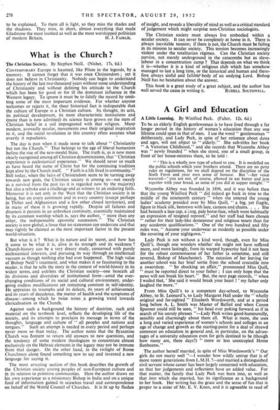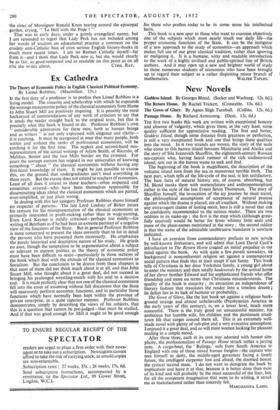A Girl and Education
A Little Learning. By Winifred Peck. (Faber. 12s. 6d.) To be an elderly English gentlewoman is to have lived through a far longer period in the history of women's education than any one lifetime could span in that of men. I use the word " gentlewoman " deliberately, and Lady Peck, in spite of her reticence about dates and ages, will not object to " elderly." She sub-titles her book " A Victorian Childhood," and she records that Wycombe Abbey was " newly founded " when she stood, one of a small group, in front of her house-mistress there, to be told : " This is a wholly,new type of school to you. It is modelled on the public schools which your brothers attend. There are no petty rules or regulations, for we shall depend on the discipline of the Sixth Form and your own sense of honour. But '—her voice wavered—' you are not, of course, allowed to eat butter and jam together with your bread, as some of you did at supper tonight.' " Wycombe Abbey was founded in 1896, and it was before then that the young Winifred Peck " did indeed go back in time to the middle of the nineteenth century " when she entered the young ladies' academy presided over by Miss Quill, " a big, yet fragile, figure in black silk, bestrewn with lace, cameos and chains. . . . She had beneath a lace cap, a ;ong, pale horse-face, which wore habitually an expression of resigned reproof," and her staff had been chosen " rather for their lady-like demeanour and religious tenets than for any academic qualifications." One of the two hundred and fifty rules was, " Assume your underwear as modestly as possible under the covering of your nightgown."
Lady Peck is not without a kind word, though, even for Miss Quill's, though one wonders whether she might not have suffered more, and more lastingly, from its warped hypocrisy had it not been for the robust commonsense of her father (a sometime, and still revered, Bishop of Manchester). The occasion of her leaving for another school was her brief sortie from the school crocodile into a sweetshop. " So shocking an affair," pronounced Miss Quill, " must be reported direct to your father ; I can only hope that the news will not break his heart." But, the next page records, " when I wailed that, ' She said it would break your heart ! ' my father only laughed the more."
From Miss Quill's to a competent day-school, to Wycombe Abbey, to St. Leonard's, to Lady Margaret Hall under the " wholly original and far-sighted " Elizabeth Wordsworth, and at a period long before A. L. Smith was Master of Balliol and when Canon Spooner could still be seen, " his head ever poking forward as if in search of his unruly phrases "—Lady Peck writes good-humouredly, sensibly and charmingly about them all. What is more, she uses a long and varied experience of women's schools and colleges in an age of change and growth as the starting-point for a deal of shrewd comment on education in general and, in particular, on the advan- tages of a university education even for girls destined to be (though how many are, these days?) more or less unoccupied Home Sunbeams."
The author herself married, in spite of Miss Wordsworth's " Our girls do not marry well "—I wonder how wildly untrue that is of more recent generations from L.M.H. ?—and married a distinguished civil servant whose career has been largely concerned with education, so that her judgements and reflections have an added value. For that matter, the family that Lady Peck was born into, as well as that into which she married, has its significance as a background to her book. Her writing has the grace and the sense of fun that is proper to a sister of Mr. E. V. Knox, and it is agreeable to read of the sister of Monsignor Ronald Knox tearing around the episcopal garden, crying, " To Hell with the Pope ! "
That was in early days, under a grimly evangelical nanny, but I am reminded to regret that Lady Peck has not included among her words of wisdom on educational practice a comment on the crudely anti-Catholic bias of even serious English history-books in much more recent times. I am no Roman Catholic myself—far from it—and I think that Lady Peck now is, but she would clearly be as fair, as good-tempered and as readable on this point as on all



































 Previous page
Previous page